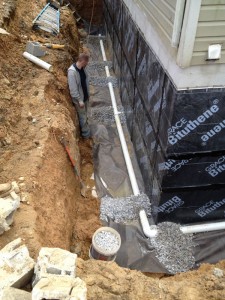 If you’ve got a drainage problem at your house, French drains are a pretty common solution. Unfortunately, common though they may be, they aren’t your best option. This type of drainage system is falling out of popularity as people realize the issues that can come with them. Know the disadvantages of French drains, so you can avoid dealing with them later on.
If you’ve got a drainage problem at your house, French drains are a pretty common solution. Unfortunately, common though they may be, they aren’t your best option. This type of drainage system is falling out of popularity as people realize the issues that can come with them. Know the disadvantages of French drains, so you can avoid dealing with them later on.
What are French drains?
In order to understand the issues associated with French drains, you must first understand how they work. This type of drain is commonly used for homes that have trouble with standing water, or when homeowners request basement waterproofing. The idea behind French drains is simple: water will follow the path of least resistance. French drains are basically trenches in the ground. These trenches are sloped downwards toward the street, an empty well, or ditches. A perforated pipe is placed into the trenches, and then surrounded by gravel or rocks. When excess ground water accumulates, it seeps through the ground, into the gravel, and through the holes of the perforated pipe. The pipe then directs the water downhill, away from your home. In the case of basement waterproofing, French drains are usually placed underground along the perimeter of your home, directing water away from the basement.
What are the problems?
There are three main issues with French drains.
- Installation. Installing a French drain is tricky business, and it can be difficult to find someone with the right finesse to make it happen. Because they usually are placed so deeply in the ground that there are many safety concerns to consider. They require some serious digging, and this may mean temporarily removing porches, patios, and even sidewalks. Your contractor and you will also need to find out where any gas lines, water lines, or other utilities are located to ensure that none are disturbed in the process.
- Clogging. The stones around the perforated pipe are meant to keep sediment from falling through the holes in the pipes, but that doesn’t always happen. Over time, some sediment will make its way through the stones and while it may not be a lot initially, it will build up. When this sediment is allowed to build up enough, it will clog and flood your basement with absolutely no warning. It can also be tough for contractors to achieve the right slope, creating drainage issues if water builds up above ground in large quantities.
- Out of sight, out of mind. Many people think that French drains don’t require much maintenance. The set-up itself is pretty simple to maintain, but because it is so easy for them to clog, you need to have your French drain checked regularly. Unfortunately, people often forget about this important aspect.
Contact Environmental Consulting and Contracting Group
If you or a family member suspects the presence of black mold or any other type of mold in your home, contact the professionals at Environmental Consulting and Contracting Group. With more than 30 years in the mold remediation industry, we have the experience and tools to help you. Contact us at 410-258-3579 or 1-877-591-MOLD (6653). Be sure to follow us on Facebook, Twitter, and Pinterest!
Tags: French Drains

